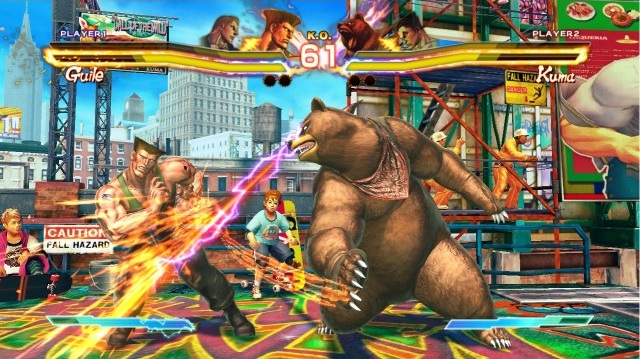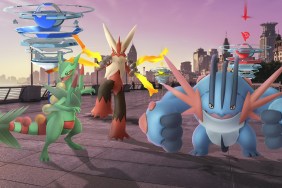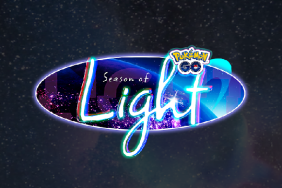I enjoy double-crossing.
On the Capcom scale of crossover madness (or is that “X"-over madness), Street Fighter X Tekken lands somewhere between the ridiculousness of Marvel vs. Capcom 3 and the technical system of Street Fighter IV. Notice that Tekken Tag Tournament isn't significant in that description, as apart from Tekken characters occupying half the roster and some combos based on Tekken's four-button layout, this is a Capcom game through and through.
If you've been following Capcom's recent history, though, that is both good news and bad news. Easing the input system to better reach a casual audience usually ticks off hardcore fighting fans, and Street Fighter X Tekken does little to hide its business decisions with DLC and the potential “Ultimate Street Fighter X Tekken” sequel. No one will blame you for boycotting this out of the feeling that you're being forced to purchase the same game twice as well as content that was could have been in the game from the very beginning. Buying into an optional microtransaction model is not usually a cause for celebration.
But look beyond these shenanigans and you'll find a tag team brawler that's surprisingly gratifying without being as spastic as Marvel vs. Capcom 3 nor as deliberately rigid as a straight-on Street Fighter title. That Capcom was able to incorporate the 3D fighters from Tekken so deftly into the Super Street Fighter IV engine cannot be understated. Except for a questionable translation for Raven and Julia, all of the Tekken characters have been rightly simplified to a tighter set of characteristic moves. Some of the four-button inputs for combos that Tekken veterans know by heart have been translated over as well, giving Tekken characters more depth in their normal moveset to compensate for their lack in special moves. The transition is so seamless that it's almost a wonder why they weren't in a crossover with Street Fighter before.
Extending an open hand to audiences for both titles, Street Fighter X Tekken's system takes a casual turn, first by including a handy guided tutorial. There, you will find that Capcom has taken away a few notable features from Super Street Fighter IV such as the Super Combo, the option of selecting one of two Ultra Combos in addition to the standard gauge for the Ultra Combo, and the one-hit shielding when performing a charged attack. Instead, every character has a special move that can be charged into an EX version of itself and even a Super Art for free. The “double hadoken” (or QCFx2 motion) has been essentially wiped out, and you can perform a preset Quick Combo as a shortcut, at the cost of one special meter block. If that weren't enough, playing on Easiest difficulty actually makes the game easy for once without some cheap-ass boss.
Similar to the standard moveset of punches and kicks in Marvel vs. Capcom 3, any sequence of attacks that go from Light to Medium to Heavy connect easily for a Boost Combo. Tack on another Heavy attack to that sequence (or press both heavy punch and hevy kick together) and the final move switches to a launcher that propels the opponent into the air and swaps your character at the same time for a juggle opportunity. This tends to be a stronger substitute for tagging out the regular way, which can leave your partner wide open on entry.
Pushing the tag team component further is the recoverable health gauge, which allows the inactive character to heal vitality while on the sidelines, as well as the special meter that's split into three segments. Anyone familiar with Street Fighter Alpha will recognize it immediately. While the meter can be used for single-character attacks like EX specials (one segment), a Cross Cancel that acts like an Alpha Counter (one segment), and a standard Super Art (two segments), a couple of tag team maneuvers are possible when the meter is full: The Cross Art combines the power of two characters into one Super Art, while the Cross Assault allows both characters on a team to barrage the opponent at once. The latter move has its tactical uses, but since the second character is controlled by the AI (unless you're playing co-op), it's hardly as consistent as the Cross Art.
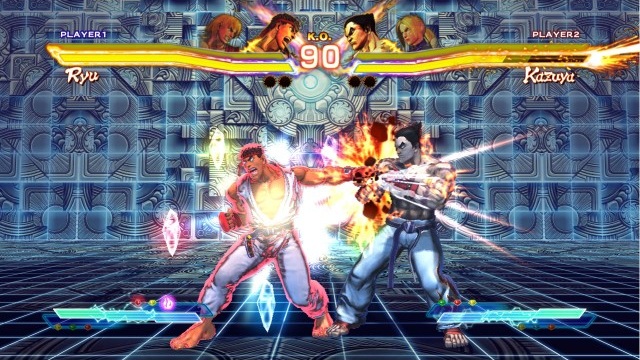
As a last ditch effort, you can even sacrifice your active character to give your remaining partner the fabled Pandora boost. Since you lose if only one of your characters is knocked out, the Pandora boost serves as an ace in the hole that can change the tide of battle in an instant. For ten seconds, your remaining character becomes tremendously powerful in attack and defense but will be knocked out if they can't finish off the opponent in time.
This new power stems from the idea behind the story, which is about Pandora's Box landing in Anarctica and… something, something, something… Street Fighter and Tekken are somehow in the same universe. The justification for the crossover doesn't really matter and I'm sure any other explanation for the crossover would be equally as trite. Just know that to view the true endings, you need to be play with the official tag teams, which are easily revealed by playing arcade mode.
Hardcore players have already complained about the dumbing down of their beloved fighting systems, though they should also notice that there's plenty of room for their prowess to shine through. The Boost Combos may be noobishly simple to perform, but they lack considerable power to a standard linked combo. Boost Combos also can't be cancelled unless you use a EX special attack, so their flexibility is limited. Instead of charging a move into a Super Art, veterans will likely cancel the second charge level for an automatic counter hit. This is already on top of ridiculous “half your health gone” juggle combos that we're sure to see at a competitive level.
This doesn't mean the fighting system is without its flaws. Tag team swaps while your character is on the ground have oddly been taken out of previous builds. Boost Combos can also sometimes interfere with regular combos; a light punch into a crouching medium punch may be possible as a linked combo but is overwritten as a Boost Combo. This causes some of the combo trials to be much more difficult than necessary and limits the potential of standard move combos.
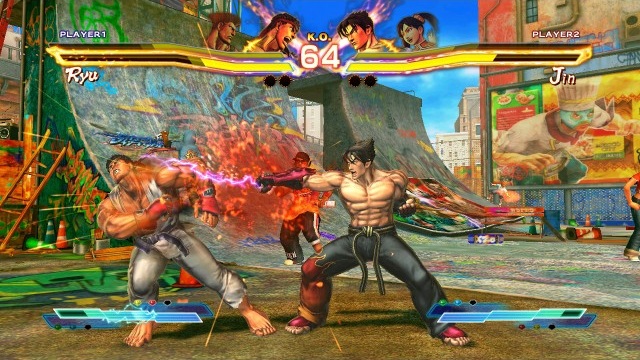
The other chief complaint comes from the gem system, which grants your character temporary boosts in power, speed, and defense once certain conditions are met, like blocking ten times or connecting with a launcher. Assist gems will make inputs even easier and enable Auto-Block, though at a hefty drawback. While the throwback to the gems in Marvel Super Heroes is welcome and it allows for plenty of costumization, there should have been an option to disable gems altogether; even if you remove them on your character, they're still active on an AI opponent. Being able to acquire new gems through standard play, instead of purchasing them through the store, would have extended the replayability and made the gem system easier to swallow. At the very least, they should have added a timer gauge for gem activation.
This incentive to pay for additional content also extends to the roster. It's already quite full with 38 characters, with nearly all of the most important characters represented, though the absence of E. Honda, Blanka, Fei Long, Makoto, Bryan Fury, Eddy, Lei Wulong, and Feng Wei feels deliberate. As such, 12 DLC characters have already been announced, so really, how fast can you say “Super Ultimate Street Fighter X Tekken Turbo Remix”? Costume packs as DLC are perfectly fine, especially in addition to the ability to customize a fighter's clothing colors a tad (mainly black or white), but game-changing content like additional characters and gems crosses the line.
Also, it's still strange that you don't have control of several mainstay options, like being able to turn the music completely off, toggle guard damage, change the damage rate, or alter the speed. Not for ranked online battles certainly, but for exhibition and arcade mode, why not? And from what I can tell, a movie gallery is absent too.
That said, Street Fighter X Tekken is among the most enjoyable fighters I've played in a long time, especially in co-op and Scramble Mode with some friends over (I've already taken names with my Abel/King team). Online mode is no slouch either, though the replay value could have been extended with a longer Mission Mode and a better acquisition system for gems. Still, it shows that Capcom is more than capable of pulling off a tag team crossover that really shouldn't have worked. It makes me wonder whether Street Fighter X Mortal Kombat will finally become a reality. (And what would be the DLC…)
-
Solid tag team crossover
-
Translates Tekken characters extremely well
-
Fun for casual, still has depth for hardcore
-
Great for co-op play and parties
-
Strong roster, but still incomplete
-
Customizable gem system
-
...but can't disable completely or acquire new gems without paying for them
-
Lacks some options
